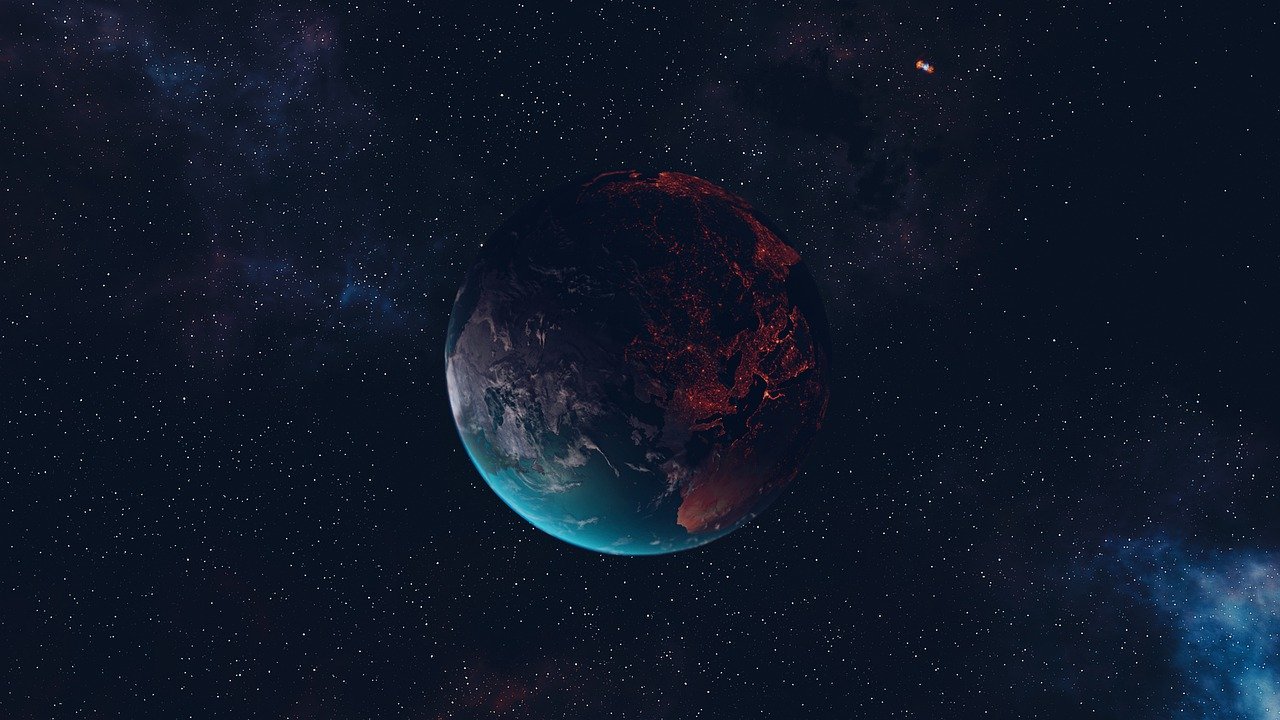


Selective Reading Through Analog Science Fiction & Fact, 2014
Having read "through" a number of year's of Analog from the 1970's and 1980's, I was curious to see whether a drop in standards accounts for the paucity of Hugo and Nebula Award wins from this magazine in more recent years (e.g. relative to Asimov's Science Fiction, since the late 1980's) or if there may be more to it. An experiment of sorts:
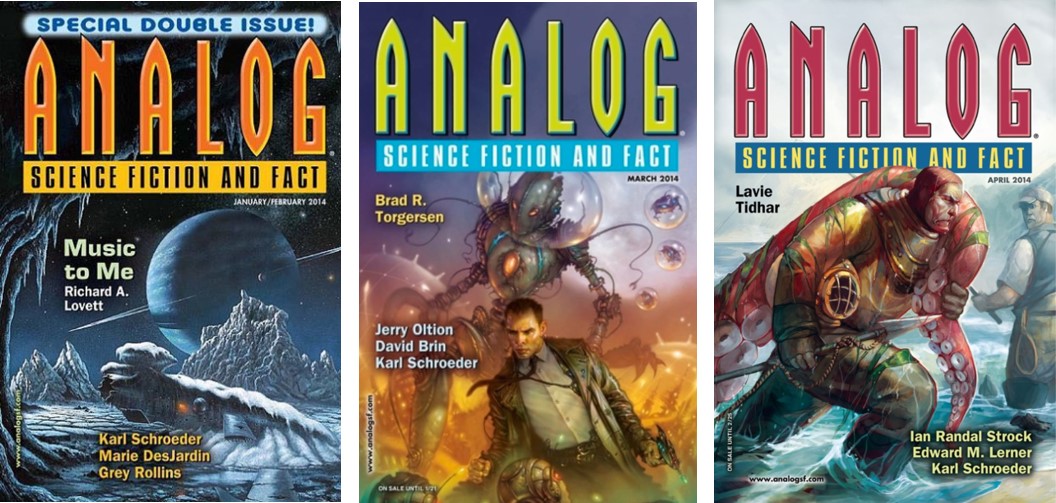
January/February 2014
Richard A. Lovett - Music to Me
Winner of the Analog reader's poll for Best Novella in 2014, this was also very positively reviewed by
Tangent upon its publication. This is a superior novella about an AI who returns from the outer solar system to Earth and becomes implanted into a young woman who is struggling with issues of her own. Through these events, the AI fights to retain a sense of self and individuality in spite of pressures to conform to an AI group. By telling the story in the first person from the AI perspective, we sympathise with the morality expressed by the AI, but also see interesting differences with humanity. Lovett uses the scenario to explore the idea of 'self' and personal value in a powerful and skillful way. A great story.
March 2014
Brad R. Torgersen - Life Flight
This was voted Best Novelette in the Analog reader's poll for 2014. It is great; telling the story of an 80 year trip on a space ship to Delta Pavonis from Earth to set up a colony there. A few different adults and children are roused from deep-sleep every ten years or so, to man the ship. Unfortunately one child who is awake from the start finds he is intolerant of deep-sleep and must see out the whole 80-year trip awake. This is a excellent novelette, full of pathos and depth, with good characterisation and pace. Highly recommended.
April 2014
Don Webb - Pollution
Okay, so Tangent essentially panned all the stories in this issue, except for a spoof I didn't fancy and none of the stories has been anthologised anywhere else, or been nominated for any awards. Okay, perhaps its not the strongest issue. No matter, I selected this as Don Webb was by far the most published author to choose from (having published over 150 short stories since the mid-1980's). This was about a nippophile (Japan-loving) young man who was looking for acceptance, and about virus-induced zombies, and about slavery, and about class struggle. And if that seems a lot for a short story, you're right - it was too much. The writing was dense and uninviting, the story was a mish-mash of ideas and the ending seemed rushed. Disappointing.
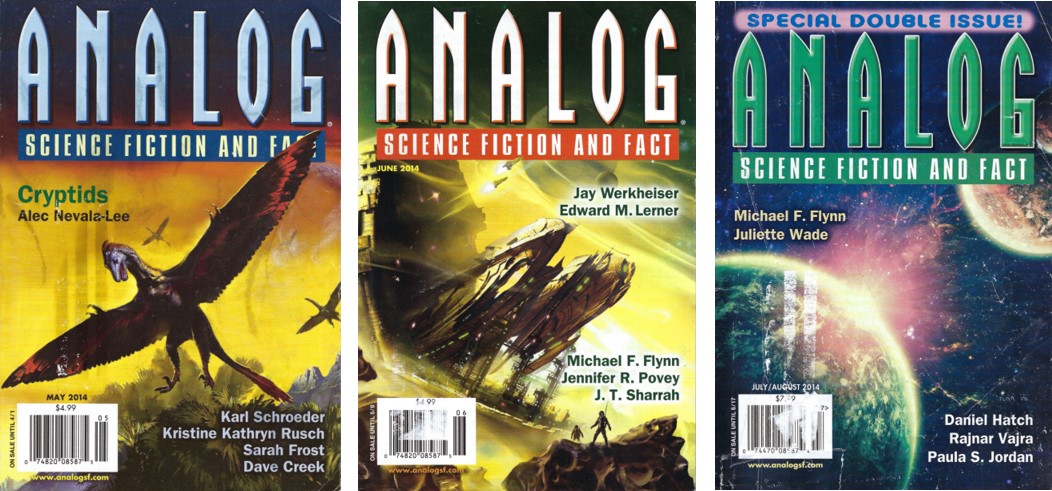
May 2014
Kristine Kathyrn Rusch - Snapshots
This won the reader's poll in Analog for best short story of the year. Given how good the Lovett and Torgersen stories were, I had high hopes for this too. This was told as a series of snapshots through history, showing the effects of gun-violence on generations of a black American family. This was weak; it was barely a story, just vignettes that failed to develop any plot, and it was not really SF either. I'm not sure what it was other than a very simplistic message that 'guns are bad'. Well, yeah, sure. One has to wonder how and why it won the reader's poll for best short story. Was that due to its simple liberal message, appealing to all the SJWs out there, rather then its actual quality?
June 2024
Michael F. Flynn - The Journeyman: In the Stone House
Flynn has co-written with Larry Niven & Jerry Pournelle (Fallen Angels), and he's been nominated for seven Hugo Awards (including for this novelette), so I was looking forward to this. I enjoyed it, but it reads like a chapter in the middle of a novel, rather than as a self-contained novelette. This is a story of humans who have crashed onto a world (called World) and, in the generations since, lost technology and reverted to a 'Poul Anderson-like sword and sorcery' type of feudal existence. It follows two travelers who are captured by the lord of a stone castle and who must use their wits, skill and brawn to survive. During the proceedings, they describe how they are on a quest to find star people who crashed, in antiquity, in a 'shuttle' they recently came across. It's quite nicely done, and the language and dialogue use here are witty and enjoyable. There's no real conclusion though. This was the second of five Journeyman tales written by Flynn, and by the looks of it they don't stand alone all that well.
July/August 2014
Timons Esaias - Sadness
Selection was a tough call this month. Most of the authors I'd never heard of, and the Michael F. Flynn offering was a further Journeyman story - selection of that would not expand the breadth of this reading exploration. I ended up plumping for Esaias' short story Sadness, as I discovered it was a rarity: an Analog story collected by both Dozois and Horton for their respective 'Year's Best' anthologies for 2014. The style of writing by Esaias here is so singular it took a little getting into and to understand, but it repaid perseverance, and ultimately was a very good short story, concerning the repression of humanity by very strange aliens who insist everyone speaks Sanskrit, worships in very specific ways, and take on new names. A powerful piece told from the perspective of 'Bookbinder'.
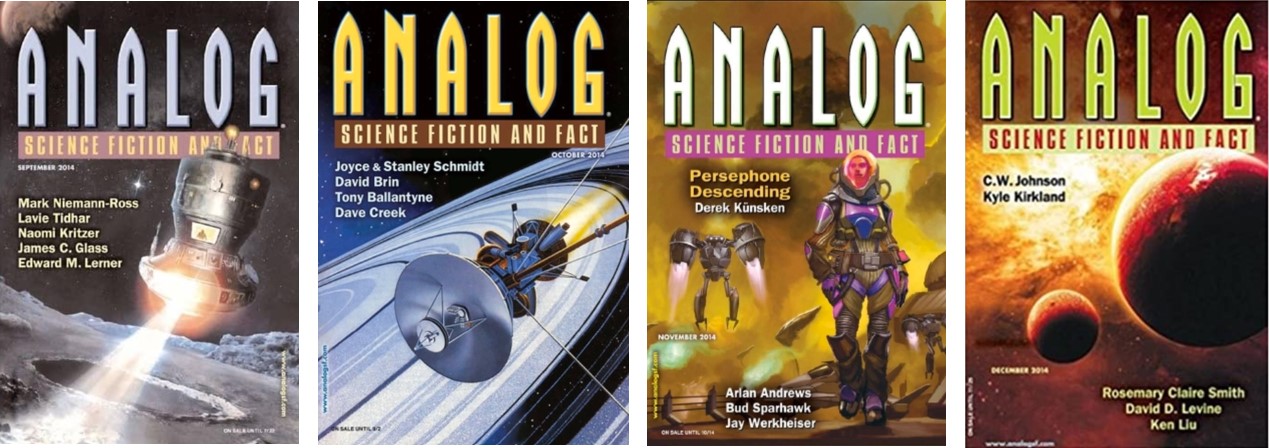
September 2014
James C. Glass - Beneath the Ice of Enceladus
This was essentially an old-fashioned adventure story set in the solar system. An astrobiologist is continuing the family tradition of searching for life on other planets and moons, this time on Saturn's moon Enceladus. Its well paced, engaging and with good tension toward the end. I enjoy hard SF stories like this, as I learn a little more about the solar system as I read, in this case that there seems to be liquid water on Enceladus (an observation actually made in 2009 by the Cassini probe - see here).
October 2014
David Brin - Chrysalis
The appearance of 'household' SF names in Analog was commonplace in the 1970's and '80's, but these days 'big names' are pretty sparse. When I came across a story by Brin in this issue, I figured I'd better give it a go. This is an interesting and quite compelling tale, that asks what might the ramifications be if much of the 'junk' DNA in our genes was not junk at all, but an evolutionary throwback to Cambrian times. A scientist experiments on the question of what occurs if the junk DNA is turned back on. This is well thought out, and albeit scientifically very unlikely, its a nice SF idea with, ultimately, horror overtones.
November 2014
Arlan Andrews, Sr - Flow
Placed second for the Hugo Award for best novella. Arlan Andrews, Sr was the founder of Sigma, the SF think tank, and has published well over 100 stories since the early 1980's. All these facts might have suggested this would be a good novella - but it wasn't. It follows a character from the icy north, on his was to the Warm Lands to sell an iceberg to the more advanced and religious southern people of his world. It may be post apocalyptic, but Andrews doesn't tell us; it may be on Earth, I'm not sure. I think the characters were human, but we're not told. Its a long story in which little action takes place, and has very little dialogue; it has no apparent point and no tidy conclusion; it's poorly written and ultimately it's boring. This reading exploration was to sample what the year offered, good and bad, and it was interesting to read this, because of why it was nominated for a Hugo. The 2015 Hugo's were one of the years influenced by the Sad Puppies group that put a nominations slate together of stories by writers they felt would not otherwise be nominated in this day and age. I have some sympathy with the frustration exhibited by the Sad Puppies, as if you are white, heterosexual and male, you seem to have very little chance of being nominated for a Hugo Award in the present times. This is for me a sad state of affairs, but the facts are hard to deny. However, putting stories like this on their 'slate' cannot have helped the puppies cause. What were they thinking? As it turned out it their cause fell flat, and the winner for Best Novella in 2015 was given to 'no award'. Ironically, if they had suggested Lovett's story (reviewed above) for nomination, it would have been highly deserving and I like to think it might have won. The fly in the ointment for the puppies would be that Lovett is black. The message would appear to be that if you want to try and claw back the Hugo's from appearing to give awards on the basis of diversity for diversities sake, you need to pick better stories for your slate from writers of any ethnicity, gender or sexual persuasion - which could include straight, white guys, but need not.
December 2014
Ken Liu - Saboteur
Liu has won multiple Hugo, Nebula and Locus Awards for his own short fiction, and is also famous for his English translation of the award-winning The Three-Body Problem by Cixin Liu (no relation). Reading this short story, I realised I'd read it before. It concerns some sabotage planned by an ex-truck driver who lost his job to automated trucks, and seeks revenge for the loss of his brother. It's not bad, but it's a little too short to develop the scenario enough to draw the reader in, and depends too much on a rather predictable sort of conclusion.
Overall comments
I undertook a read through of 2014 Analog, as I wanted to see if the lack of awards and recognition had decreased since the 1970's and 1980's due to a drop in overall quality of the printed stories, or if there seemed to be other factors in play. I have read one story per issue of several much earlier years, from Ben Bova's time, and from early in Stanley Schmidt's long stint as editor. While I haven't read all the stories each time, only a selection, that selection was based on a fair bit of research as to what might be good, what won awards, who was most representative of the time, and so on. So how does 1983 Analog, for instance, compare to 2014?
Overall, I have to say 1983 Analog was of a higher quality. I thought at least 10 stories were good, and at least 6 were excellent, including a classic of the genre. There was only really one dud that I read in that year. In contrast, 2014 provided 5 stories I would class as good, 2 or 3 were excellent, and 3 were duds. On the face of it this might explain the lack of honours accrued by Analog stories in recent years, compared to other magazines. Not a single story has been nominated for the Hugo Award for Best Short Story since Michael A. Burstein's Seventy Five Years in 2006, 14 years ago. However, close inspection reveals that, since 2013, Asimov's Science Fiction hardly gets a look in either, with almost all nominations for Best Short Story coming from the plethora of new online magazines. Perhaps the lack of awards therefore shouldn't be a concern - there are far more published magazines for short SF than ever, and the net has grown so wide that any specific magazine will struggle to maintain the awards of it's print heyday.
And yet, the overall quality does seem to have slipped a bit against its own old standards, and why would this be? Part of the reason may relate to which authors still submit to Analog. The 1983 roster of authors I selected reads like a who's who of famous SF novelists: Pohl, Silverberg, Bova, Bear, Forward, Zahn, Brin, Vinge. All household names in SF due mostly to novel-length book sales. Spring forward to 2014 and the household names in SF are not well represented: Brin crops up again... and that's it. I'm not saying the likes of Lovett and Torgersen cannot write good stories - they clearly can. But they seem be writers who predominantly write for Analog. Perhaps the 'bigger names' no longer seek to get into Analog these days, which seems more like a stepping off point now for young or new writers than a repository for publication of established writer's short fiction. I suspect this is reflective of a general change in SF magazines - short stories in the magazines are seen as building your standing and career, a means to an end, but the goal is book publications of novels and story collections. If this is the case, there's perhaps little the old print magazines can do to prevent the gradual erosion of quality.
And yet... at least two of the stories in 2104 (Music to Me and Life Flight) were really very good. And if you can find them, read and enjoy.